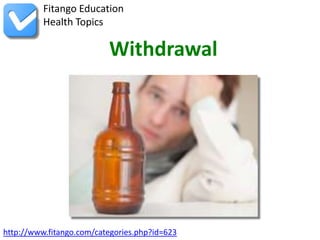
Withdrawal
- 2. 1 Overview Alcohol withdrawal syndrome is a set of symptoms that people who have a history of alcoholism experience when they stop drinking. People who are casual drinkers rarely have withdrawal symptoms. People who have gone through withdrawal before are more likely to have withdrawal symptoms each time they quit drinking.
- 3. 2 Overview Symptoms of alcohol withdrawal can range from severe to mild, and can include: -- Insomnia -- Nightmares -- Irritability -- Fatigue
- 4. 3 Overview -- Shakes -- Sweats -- Anxiety -- Depression -- Headaches -- Decreased appetite
- 5. 4 Overview Severe withdrawal symptoms include fever, convulsions and delirium tremens (DTs). Those who experience DTs may become confused, anxious and even have hallucinations. DTs can be very serious if they are not treated by a doctor.
- 6. 5 Medical attention for withdrawal Yes. A doctor needs to know you're going through withdrawal so they can make sure it doesn't lead to more serious problems. If you go through withdrawal many times without getting treatment, your next set of symptoms may be worse each time. So even if your withdrawal symptoms are not terrible, it's essential to consult a doctor. This is especially true for those who have have experienced severe withdrawal symptoms before and people who have other health concerns, like heart disease, lung disease
- 7. 6 Medical attention for withdrawal Those who quit using other drugs (tobacco, injected drugs or cocaine) at the same time might have severe withdrawal problems. They should see a doctor before they quit. **How can a doctor help me if I’m in withdrawal?**
- 8. 7 Medical attention for withdrawal A doctor can provide the medical support you need to succeed in your efforts to defeat alcoholism. They can keep track of your symptoms to help avoid any serious health problems. A doctor can also prescribe medication to treat the anxiety, shakes and confusion that can come with alcohol withdrawal. If you are given these medicines at the early stages of withdrawal, they prevent your symptoms from getting worse.
- 9. 8 Medical attention for withdrawal**What can my family and friends do to help me while I'm through withdrawal?**The urge to drink during withdrawal can be very strong. A support system built from your family and friends can help you resist the urge to drink. After the withdrawal symptoms go away, it's important to join a treatment or sobriety program, such as Alcoholics Anonymous. These programs can provide the support to avoid relapse.
- 10. 9 Symptoms Hippocrates, writing around 400 B.C., gave us our first written clinical picture of alcohol withdrawal when he wrote that if the patient is “in the prime of life and if from drinking he has trembling hands,” it may well be the case that the patient is showing withdrawal signs and symptoms. To this day, alcohol withdrawal remains underrecognized and undertreated. The signs and symptoms of acute alcohol withdrawal generally start 6 to 24 hours after the patient takes his last drink. Alcohol wi
- 11. 10 Symptoms Restlessness, irritability, anxiety, agitation Anorexia (lack of appetite), nausea, vomiting Tremor (shakiness), elevated heart rate, increased blood pressure Insomnia, intense dreaming, nightmares
- 12. 11 Symptoms Poor concentration, impaired memory and judgment Increased sensitivity to sound, light, and tactile sensations Hallucinations (auditory, visual, or tactile) Delusions, usually of paranoid or persecutory varieties
- 13. 12 Symptoms Grand mal seizures (grand mal seizures represent a severe, generalized, abnormal electrical discharge of the major portions of the brain, resulting in loss of consciousness, brief cessation of breathing, and muscle rigidity followed by muscle jerking; a brief period of sleep, awakening later with some mild to even severe confusion, generally occurs) Hyperthermia (high fever)
- 14. 13 Symptoms Delirium with disorientation with regard to time, place, person, and situation; fluctuation in level of consciousness
- 15. 14 Symptoms Mild alcohol withdrawal generally consists of anxiety, irritability, difficulty sleeping, and decreased appetite. Severe alcohol withdrawal usually is characterized by obvious trembling of the hands and arms, sweating, elevation of pulse (above 100) and blood pressure (greater than 140/90), nausea (sometimes with vomiting), and hypersensitivity to noises (which seem louder than usual) and light (which appears brighter than usual). Brief periods of hearing and seeing things that are not present (